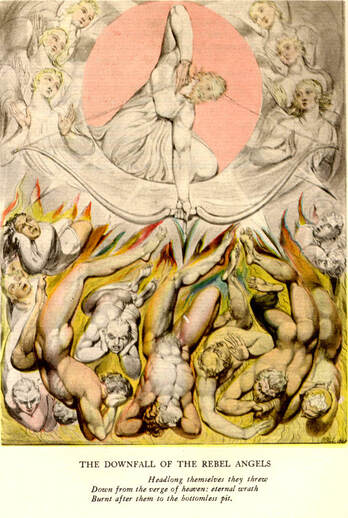|
Caption: William Blake’s watercolor for the sixth book of Paradise Lost, 1808. Milton’s Paradise Lost is at once conventional and subversive of convention: The epic draws from the tradition of heroic poetry, the brave and necessarily unethical hero, only to redefine poetic subject matter, perspective and language. Singing of heavenly, not earthly, war, Milton dispenses with the solely virtuous and villainous, the clearly good and bad, the simplistic and impersonal, and favors the individuality, complexity and moral ambiguity of character that tragedy brings. Paradise Lost is sooner a lament of the fallen Satan, the fallen Eve and Adam, a rebuke of the tyranny of God’s monarchy and the inequity of accidental divine grace and blind Protestant predestination. Paradise Lost is a remembrance of the atrocity that divinity perpetuates, and people in its name: God and his Promised Land, a Land of Canaan, that was to be conquered, and seven nations to be killed by one; the anti-Semitism of the gospels; the barbarity of all holy wars. Milton, an anti-monarchist, neither celebrates triumphant heaven nor condemns revolting angel and man. Neither glorifying and absolving nor damning, he laments. Satan and man revolt and fall — but too calmly, too melodically, too symmetrically, too beautifully, with too great conviction and resilience. Linguistically and stylistically Milton threads a tragic, nihilistic, cold and remote symmetry through his republican epic. The reader can empathize neither with God’s tyranny (from Milton’s autarchic presentation of God) nor Satan’s blasphemy (for adherence to the biblical narrative). And thus — disabused, without comfort, in a limbo between God and Satan, Heaven and Hell, Earth hangs, and the reader is confronted with the futility of heroism and the injustice of the Bible, literary tradition and our world. The reader blasphemes and revolts and falls with Satan and Adam and Eve. Paradise Lost, then, is a history, a remembrance, too late and of no use, of our human sin. Milton’s is a composer’s art — symmetrical, abstract, at once symbolic and individual, contradictory and most clear. NICKOLAS VACCARONickolas is a columnist for the Paper Crane.
0 Comments
Leave a Reply. |
Details
Archives
February 2024
CategoriesWould you like to publish a guest column? Insert your email and we will contact you.
|

 RSS Feed
RSS Feed